- Home
- Lisa Kleypas
Marrying Winterborne Page 23
Marrying Winterborne Read online
Page 23
The three sisters occupied a corner of the parlor, quiet and wide-eyed as the group of matrons chatted and drank tea to the health of the Queen. A genial discussion of the weather led to a consensus that it had been unusually cold, and spring would certainly be late that year.
Helen paid close attention as Lady Berwick sought the general opinion on the dressmaker at Winterborne’s, and was reassured from all sides that the lady in question, Mrs. Allenby, produced fashions of exceptional quality. Now that Mrs. Allenby had become an official court dressmaker, one could not secure an appointment without first being placed on a waiting list.
“One assumes, however,” a dowager remarked with a smile, “that Lady Helen will be able to obtain an appointment without having to wait.”
Helen kept her gaze modestly down.
“Indeed she will,” Lady Berwick answered for her. “Mr. Winterborne has been most accommodating.”
“You’ve made his acquaintance?” one of the ladies asked.
A multitude of chairs creaked in unison as the group leaned forward, ears twitching to catch the countess’s reply.
“He escorted us to London on the train.”
As excited murmurs fluttered among the group, Lady Berwick cast Helen a meaningful glance.
Helen instantly took the cue. “If your ladyship has no objection,” she said demurely, “my sisters and I will withdraw to study our history lessons.”
“Very good, my dear, attend to your education.”
Helen and the twins curtsied to the group, and left the room. As they crossed the threshold, a barrage of questions about Mr. Winterborne filled the parlor.
“Let’s go upstairs,” Helen told the twins uncomfortably as they paused to listen. “Eavesdroppers hear no good of themselves.”
“Yes,” Pandora conceded, “but they hear fascinating things about other people.”
“Hush,” Cassandra urged in a whisper, straining to listen.
“. . . his features are pleasing, although not as delicate as one might wish,” Lady Berwick was saying. She paused, her voice lowering marginally. “He has an abundant crop of hair—jet black—a virile development of beard, a strapping build, and a robust physique.”
“And his temperament?” someone asked.
“As high-spirited as a Barbary stallion,” Lady Berwick replied with relish. “Obviously he is well-adapted for the duties of paternity.”
An excited volley of comments and questions followed.
“I wonder if they ever actually talk about charity events at their meetings,” Cassandra whispered drolly, while Helen tugged her away.
HAVING MANAGED TO survive the ladies’ gathering without committing social suicide, Pandora, Cassandra, and Helen were all excused from the obligation of receiving callers during visiting hours the next day. Pandora cajoled Cassandra into helping with the artwork for her board game, while Helen sat alone with a book in the upstairs parlor.
For several minutes, she stared at the words without reading them, while her mind spun in a weary carousel. Chilled despite the warmth of the room, she set the book aside and wrapped her arms around herself.
“My lady.” The footman, Peter, had come to the threshold of the parlor. “Lady Berwick wishes for you to join her in the receiving room.”
Straightening in her chair, Helen gave him a perplexed glance. “Did she explain why?”
“To help entertain a visitor.”
Helen stood uneasily. “Did she send for the twins as well?”
“No, my lady, only you.”
“Please tell her that I’ll be down directly.”
After smoothing her hair and straightening her skirts, Helen descended the stairs and went to the receiving room. She blinked, her steps slowing, as she saw that Lady Berwick was waiting for her at the threshold.
“Ma’am,” she said with a questioning frown.
The countess kept her back turned to the visitor in the receiving room. Her posture was upright and elegant as always, but something about her reminded Helen of a starling she’d once seen perched on the hand of an itinerant bird seller. The bird’s wings had been pinned to its sides with fetters and a length of packthread . . . but its eyes had been wild and bright with the longing for freedom.
“Unexpectedly,” Lady Berwick said in a soft undertone, “my husband’s heir has come to meet you. You need say very little to him. Straighten your spine.”
With no more preparation than that, Helen found herself pulled into the receiving room.
“Lady Helen,” the countess said evenly, “this is my nephew, Mr. Vance.”
Chapter 23
HELEN FELT AN ALL-OVER sting, as if she’d been dropped into a flash-fire. Then she couldn’t feel anything at all except the brutal pounding of her heart, like a fist beating against a closed door. She curtsied without lifting her gaze.
“How do you do?” she heard him murmur. A pleasant voice, dry and smooth, not too deep.
Some outside force seemed to be guiding Helen’s actions. She entered the room and went to a chair near the settee, arranging her skirts by force of habit. After Vance had occupied the settee, she brought herself to look at him.
Albion Vance was singularly handsome in a way that made her skin crawl. She had never seen anyone who looked like him, his complexion white and incongruously youthful, his eyes pale gray-blue, his cropped hair snow-colored and gleaming like the inside of an oyster shell. His honed features reminded her of the thin-nosed wax heads in barbershop windows, set out to display the latest hairdressing styles. He was an average-sized man, lean and compactly built, his legs crossed with feline grace.
With an unpleasant shock of recognition, Helen saw that his brows and lashes were dark, just as hers were. Oh, how peculiar this was—she was grateful for the unearthly calm that had settled over her, muffling every sensation.
Vance regarded her with a detached stare. There was something corrupt and magnetic about him, the sense of an icy flame animating a self-interested spirit.
“You remind me of your mother,” he observed. “Although you are more delicate.”
Perfectly aware that she had instantly been assessed and found lacking, Helen asked, “Were you acquainted with her, Mr. Vance? I don’t recall having seen you at Eversby Priory.”
“From time to time I saw her at social events, when she was at town.” He smiled, revealing a perfect row of small white teeth. “A captivating beauty. Childlike in her impetuosity. She loved to dance and couldn’t keep her feet still when music was playing. One time I told her that she reminded me of that charming tale, the one with the red shoes.”
Helen had always hated that story, in which a little girl who had dared to wear red shoes to her confirmation had been doomed to dance in them until she died. “You’re referring to the one by Hans Christian Andersen? It’s a morality tale about the wages of sin, is it not?”
His smile faded, and his gaze returned to hers, now appraising rather than dismissive. “I confess, I don’t recall the moral of the story.”
“No doubt it’s been a long time since you’ve read it.” Helen made her face into the inscrutable mask that had always annoyed the twins and provoked them to call her a sphinx. “The red shoes become instruments of death, after a girl yields to temptation.”
Vance regarded her suspiciously, clearly wondering if that had been a deliberate dig. “I was sorry to learn of your mother’s passing, and more recently, of your father and brother. These have been tragic times for the Ravenels.”
“We hope for better days ahead,” Helen said in a neutral tone.
Vance turned to Lady Berwick with an unsettling, foxlike grin. “The Ravenels seem to be recovering nicely. Our clever Kathleen has certainly wasted no time in snapping up the next Earl of Trenear.”
The countess couldn’t entirely conceal her annoyance at the implication that Kathleen had married Devon out of calculation and opportunism. “It is a love match,” she said shortly.
“So was her first marriage
. How convenient for Kathleen that she loves so easily.”
Helen loathed him. There was something polluted about him, something unappeasably cruel. She was appalled that his blood ran through her veins. She remembered what Rhys had said a few nights earlier: Any child of his is demon spawn, and would come to no good. Now having met Vance, she had to agree. How could her mother have fallen under the spell of a man like this? How could Peggy Crewe?
It must be that evil had its own attractions, just as goodness did.
Vance turned back to her. “Lady Helen, I have heard that you are engaged to marry Mr. Winterborne. A pity that you must take a husband outside your appropriate sphere. But still, my congratulations to you both.”
The comment rankled far more than when Lady Berwick had said the same thing in Hampshire. Only the awareness that Vance was goading her deliberately kept Helen from losing her composure. But she was sorely tempted to reply that if he were so concerned about people staying within their “appropriate spheres,” he should have refrained from having affairs with married women.
“I do hope someone has cautioned you,” Vance continued, “that your children may turn out to be a coarse, rebellious lot, no matter how gently they’re reared. It’s in the blood. One might tame a wolf, but its offspring will always be born wild. The Welsh are volatile and dishonest by nature. They lie easily and often, even when the truth would serve just as well. They love nothing more than to spite their betters, and they will do or say anything to avoid honest work.”
Helen thought of Rhys, who had worked ceaselessly for his entire life, and had done nothing to deserve the contempt of a man born to a life of privilege. Feeling her hands begin to ball into tight fists, she forced them to remain folded in her lap. “How have you come to be so informed on the subject?” she asked.
Lady Berwick tried to intercede. “Mr. Vance, I think—”
“Much of it is common knowledge,” he told Helen. “But I also toured throughout Wales to gather information for a pamphlet I was writing. I felt it my obligation to establish the necessity of banishing the Welsh language from their schools. It’s a poor medium of instruction, and yet they stubbornly insist on clinging to it.”
“Imagine,” Helen said softly.
“Oh yes,” Vance said, either missing the edge of sarcasm, or choosing to ignore it. “Something must be done to awaken their intelligence, and it begins with forcing English on them, whether they like it or not.” As he continued, Helen saw that he was no longer posturing or trying to provoke her, but rather speaking with sincere conviction. “The Welsh must be saved from their own sloth and brutality. As things stand now, they don’t even make fit servants.”
Lady Berwick glanced quickly at Helen’s stiff face, and sought to ease the tension. “You must have found it a relief to return to England from your tour,” she said to Vance.
His reply was emphatic. “I would rather be thrown in the fiery pit of hell than return to Wales.”
Unable to tolerate him for another second, Helen stood and said coolly, “I’m sure that can be arranged, Mr. Vance.”
Caught off guard, Vance rose slowly to his feet. “Why, you—”
“Do excuse me,” Helen said. “I have correspondence to attend to.” And she left the room without another word, fighting every instinct to keep from breaking into a run.
HELEN HAD NO idea how many minutes passed as she lay curled on her bed, using one hand to press a folded handkerchief against her streaming eyes. She tried to breathe around the sharp repeated pains in her throat.
Having no father at all would have been infinitely better than this. Albion Vance was more hateful than she could ever have imagined, warped in all directions. And she had come from him. His blood ran in her veins like venom.
The sins of the fathers shall be visited on the children. Everyone knew that Biblical principle. Somewhere in her nature, something vile must have been passed down from him.
There came a brief tap at her door, and Lady Berwick entered, carrying two glasses of amber liquid. “You handled yourself very well,” she remarked, pausing at the foot of the bed.
“By insulting your guest?” Helen asked in a waterlogged voice.
“He was not my guest,” the countess said tersely. “He’s a despicable parasite. A worm who would feast on the cankered sores of Job. I had no idea that Vance would appear today without a word of warning.”
Peeling the damp handkerchief from her eyes, Helen blew her nose. “Mr. Winterborne will be angry,” she said. “He made it clear that I wasn’t to associate with Mr. Vance in any way.”
“Then I shouldn’t tell him, if I were you.”
Helen’s fingers closed around the handkerchief, compressing it into a ball. “You’re advising me to keep a secret from him?”
“I believe you and I are both aware of why it is very much in your interest not to tell Mr. Winterborne.”
Helen stared at her dumbly. Oh, God, she knew, she knew.
Coming around to the side of the bed, Lady Berwick gave her one of the glasses. “Brandy,” she said.
Lifting the drink to her lips, Helen took a cautious sip, and another. It burned her lips, and the taste was very sharp. “I thought ladies weren’t supposed to drink brandy,” she said huskily.
“Not in public. However, one may take it in private when a stimulant is required.”
As Helen sipped the brandy, the countess spoke to her without superiority, but rather unsparing honesty tempered with a surprising touch of kindness. “Last year, when I informed Vance that Kathleen was to marry into your family, he confided in me about his affair with your mother. He claimed you were his child. The first time I saw you, I had no doubt of it. Your hair is the color his once was, and your brows and eyes are the same.”
“Does Kathleen know?”
“No, she has no idea. I wasn’t certain if you yourself knew, until I saw your face just before you entered the parlor. But you composed yourself quickly. Your self-possession was admirable, Helen.”
“Did Mr. Vance intend to reveal the news to me today?”
“Yes. However, you foiled his plans for a dramatic scene.” The countess paused to sip her brandy, and said darkly, “Before he left, he asked me to make it perfectly clear to you that he’s your father.”
“That word doesn’t apply to him.”
“I agree. A man is not entitled to be called a father merely because he once had a well-timed spasm of the loins.”
Helen smiled faintly despite the fog of gloom. It sounded like something Kathleen might have said. Propping herself higher on the bed, she rubbed the sore corners of her eyes with a thumb and forefinger. “He’ll want money,” she said flatly.
“Obviously. You will soon become a conduit to one of the greatest fortunes in England. I have no doubt that in the future, he will also ask you to influence your husband’s business decisions.”
“I wouldn’t do that to Mr. Winterborne. Besides . . . I couldn’t live with Mr. Vance’s threats hanging over my head.”
“I have for decades, my girl. Since the day I married Lord Berwick, I knew that until I produced male issue, I would have to kowtow to Vance. Now you must as well. If you don’t comply with his demands, he will ruin your marriage. Possibly before it even begins.”
“He won’t have the chance,” Helen said dully. “I’m going to tell Mr. Winterborne myself.”
Lady Berwick’s eyes enlarged until the whites were fully visible. “You’re not so foolish as to believe that he would still want you if he knew.”
“No, he won’t want me. But I owe him the truth.”
After swallowing the rest of her brandy in an impatient gulp, the countess set the glass aside and spoke with irritated conviction. “Good heavens, child, I want you to mind every word I’m about to say.” She waited until Helen’s tormented gaze had met hers. “The world is unkind to women. Our futures are founded on sand. I am a countess, Helen, and yet in the winter of life I am likely to become a poor widow, a mere nulli
ty. You must do whatever is necessary to marry Mr. Winterborne, because there is one thing a woman needs above all else: security. Even if you should lose your husband’s affections, the smallest splinter of his fortune will guarantee that you will never suffer degradation or poverty. Better still if you should bear a son—there is the source of a woman’s true power and influence.”
“Mr. Winterborne won’t want a child who is descended from Albion Vance.”
“There’s nothing he can do about it after it happens, is there?”
Helen’s eyes widened. “I couldn’t deceive him that way.”
“My dear,” Lady Berwick said crisply, “you are naïve. Do you think there aren’t parts of his life, past and present, which he keeps secret from you? Husbands and wives are never completely honest with each other—no marriage could survive it.”
Becoming aware of a throbbing at her temples, and a gathering nausea in her stomach, Helen wondered desperately if a migraine were coming on. “I feel ill,” she whispered.
“Finish your brandy.” The countess went to the window and pushed a fold of the curtain aside to take in the outside view. “Vance wants to meet with you tomorrow. If you refuse, he’ll go to Mr. Winterborne before the day is out.”
“I won’t refuse,” Helen said, thinking grimly that she would tell Rhys the truth at a time she chose, on her own terms.
“I’ll send word for him to meet us on neutral territory. It won’t do to have him call at Ravenel House again.”
Helen thought for a moment. “The British Museum,” she suggested. “The twins have been asking to see the Zoological Galleries. He and I could exchange a few words there without anyone noticing.”
“Yes, I think that would do. What should I suggest as a meeting-place?”
Helen paused in the act of lifting the glass to her lips. “The poisonous serpents exhibit,” she said, and took another sip.
Lady Berwick smiled slightly, and then looked grim. “I already know the way Vance will present the situation to you, as I am all too familiar with the way his mind works. He won’t like the word blackmail; he’ll frame it as something like an annual tax, in return for allowing you to find happiness with Mr. Winterborne.”

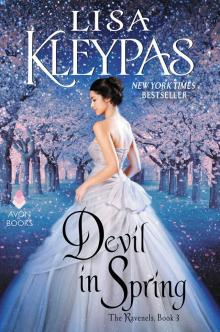 Devil in Spring
Devil in Spring Sugar Daddy
Sugar Daddy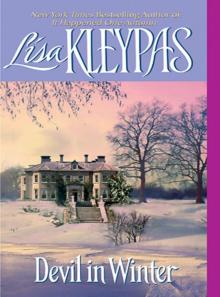 Devil in Winter
Devil in Winter Dreaming of You
Dreaming of You Christmas Eve at Friday Harbor
Christmas Eve at Friday Harbor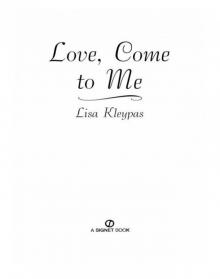 Love, Come to Me
Love, Come to Me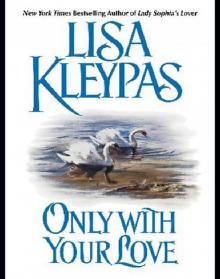 Only With Your Love
Only With Your Love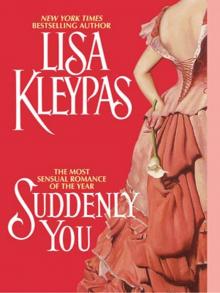 Suddenly You
Suddenly You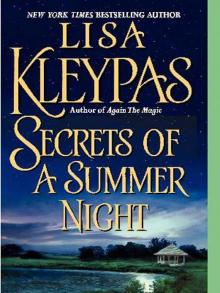 Secrets of a Summer Night
Secrets of a Summer Night Cold-Hearted Rake
Cold-Hearted Rake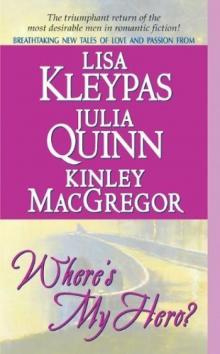 Where's My Hero?
Where's My Hero? Gifts of Love
Gifts of Love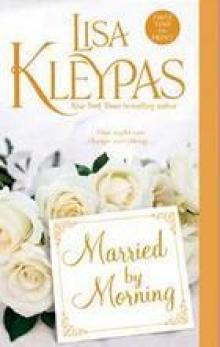 Married by Morning
Married by Morning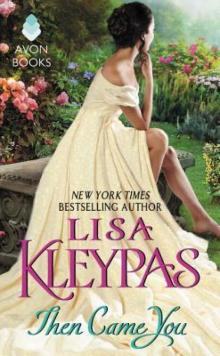 Then Came You
Then Came You Wish List
Wish List Where Dreams Begin
Where Dreams Begin A Historical Christmas Present
A Historical Christmas Present Somewhere I'll Find You
Somewhere I'll Find You Scandal in Spring
Scandal in Spring Someone to Watch Over Me
Someone to Watch Over Me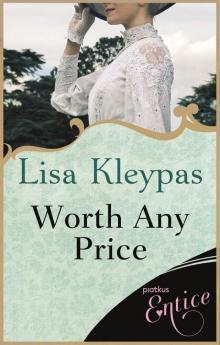 Worth Any Price
Worth Any Price Prince of Dreams
Prince of Dreams It Happened One Autumn
It Happened One Autumn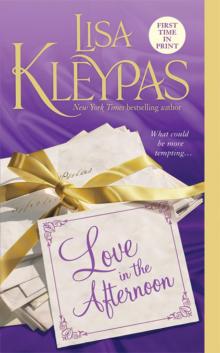 Love in the Afternoon
Love in the Afternoon Devil's Daughter
Devil's Daughter A Wallflower Christmas
A Wallflower Christmas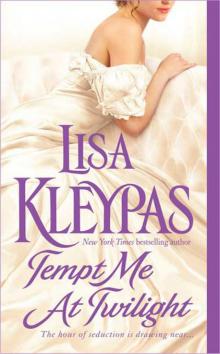 Tempt Me at Twilight
Tempt Me at Twilight Brown-Eyed Girl
Brown-Eyed Girl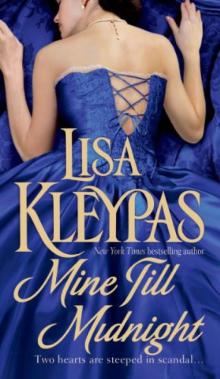 Mine Till Midnight
Mine Till Midnight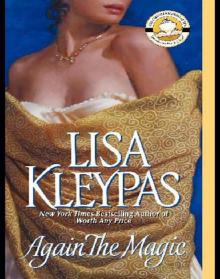 Again the Magic
Again the Magic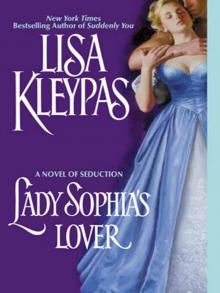 Lady Sophia's Lover
Lady Sophia's Lover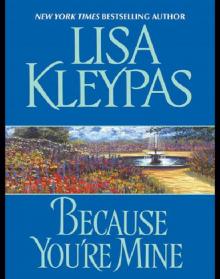 Because You're Mine
Because You're Mine Midnight Angel
Midnight Angel Smooth-Talking Stranger
Smooth-Talking Stranger Blue-Eyed Devil
Blue-Eyed Devil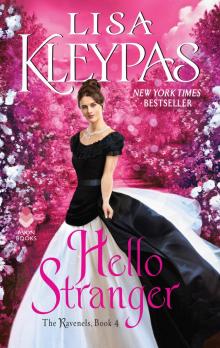 Hello Stranger
Hello Stranger Dream Lake
Dream Lake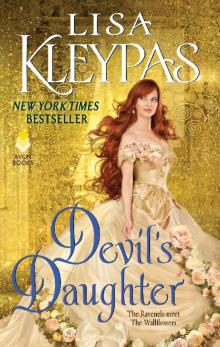 Devil's Daughter: The Ravenels Meet the Wallflowers
Devil's Daughter: The Ravenels Meet the Wallflowers A Christmas to Remember
A Christmas to Remember Smooth Talking Stranger
Smooth Talking Stranger Crystal Cove
Crystal Cove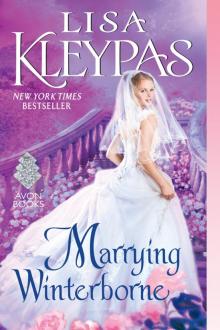 Marrying Winterborne
Marrying Winterborne Stranger in My Arms
Stranger in My Arms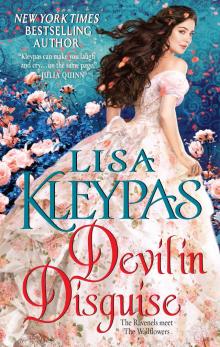 Devil in Disguise
Devil in Disguise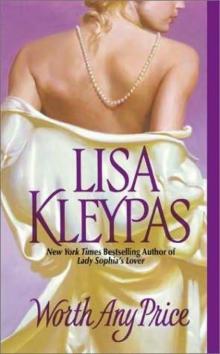 Worth Any Price bsr-3
Worth Any Price bsr-3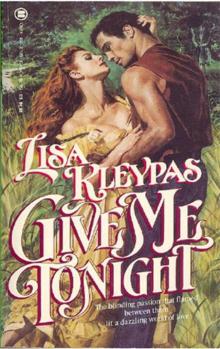 Give Me Tonight
Give Me Tonight Rainshadow Road fh-2
Rainshadow Road fh-2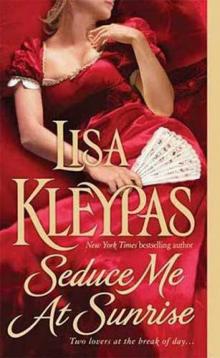 Seduce Me At Sunrise
Seduce Me At Sunrise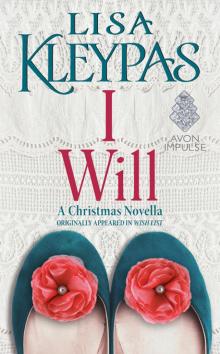 I Will
I Will Someone to Watch Over Me bsr-1
Someone to Watch Over Me bsr-1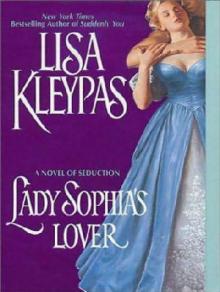 Lady Sophias Lover bsr-2
Lady Sophias Lover bsr-2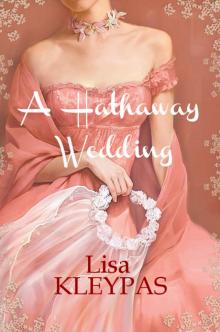 A Hathaway Wedding
A Hathaway Wedding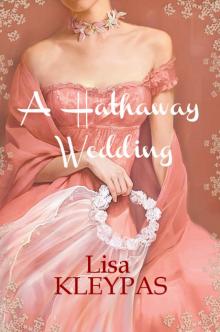 A Hathaway Wedding (Hathaways Bk2.5)
A Hathaway Wedding (Hathaways Bk2.5)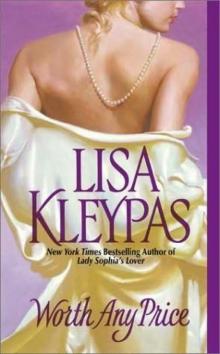 Worth Any Price - Bow Street 3
Worth Any Price - Bow Street 3 Christmas with Holly
Christmas with Holly